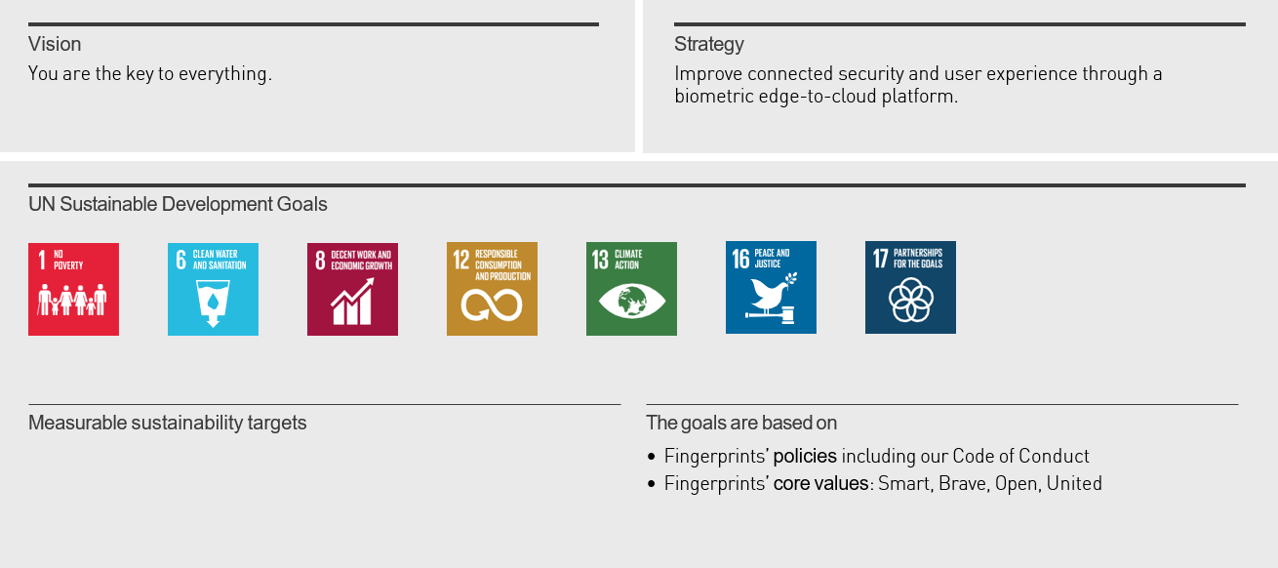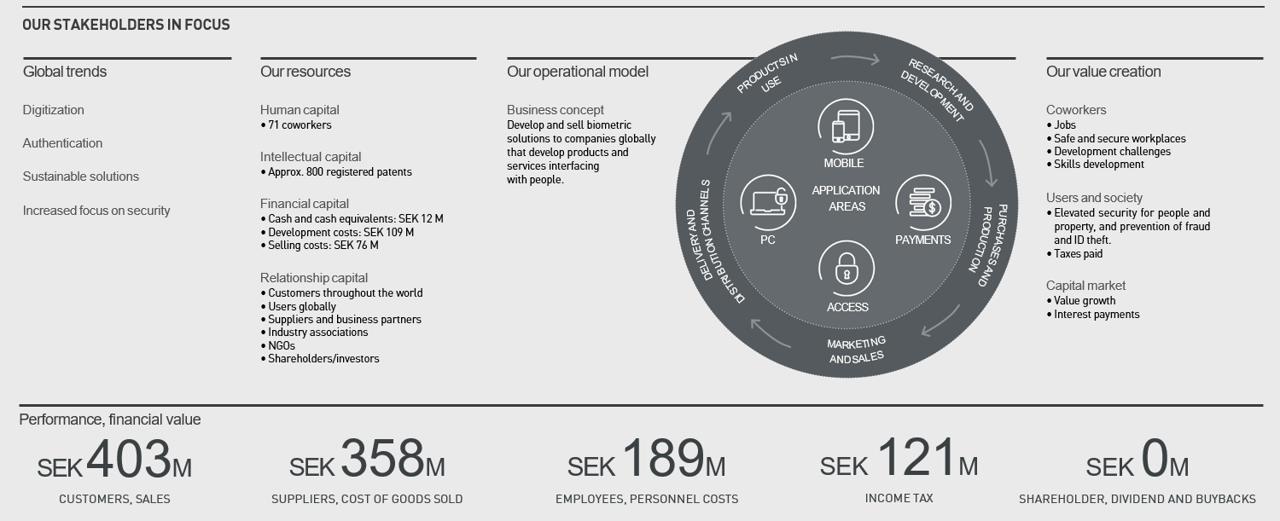Sustainability
Sustainability at Fingerprints
We are working to strengthen and illuminate the benefits that our products create from a sustainability perspective and to reduce the negative impact of our operations, products and supply chain.
BUSINESS-INTEGRATED
SUSTAINABILITY FRAMEWORK
Sustainability work in Fingerprints is carried out within the company’s framework, which comprises a vision, core values and policies, including the Code of Conduct and sustainability targets. Fingerprints wholeheartedly supports the UN’s 17 Sustainable Development Goals (SDGs). Connected to our specific operations and material focus areas, we have decided to focus on seven of these goals.
We have defined a set of core sustainability targets, connected to our focus areas. The continuous implementation of the targets represents the core of the company’s sustainability work and is part of our company-wide balanced scorecard, which contributes to giving sustainability aspects the same status as the company’s other objectives. The targets have been broken down to each business area and function to determine exactly how they can contribute to target fulfilment. In our opinion, this enhances both commitment and participation.
The visibility and integration of the sustainability targets also makes it easier for managers to follow up the work. To integrate sustainability into our internal processes, we have been inspired by the Global Reporting Initiative (GRI). Our environmental and quality management systems are certified in accordance with ISO 14001 and ISO 9001. A working method has been rolled out to manage our overall policies and Code of Conduct, with the aim of managing all policy areas equally. One area of major importance is our work on responsible sourcing, and all direct suppliers must thus sign our Code of Conduct for Suppliers.

INITIATIVES AND PARTNERSHIPS
We believe that companies working collectively on sustainability challenges is the best way to achieve long-term results. In order to ensure the security and functionality of both mobile payments and card payments, we have collaborated with key payment system players, e.g. Eurosmart, a sector organization for businesses active in smart security, such as digital identities, data security, cyber security, Internet of Things (IoT), payment solutions and border control. Another example is EMVCo, a global technological body that facilitates worldwide interoperability and acceptance of secure payments by handling and developing what are known as EMV® specifications and related test processes.
In June 2022, the European Commission adopted the Corporate Sustainability Reporting Directive (CSRD) which will replace and build further upon the Non-Financial Reporting Directive (NFRD) by introducing more detailed reporting requirements and expanding the number of companies that are encompassed.
On July 31, 2023, the European Commission published the first set of the European sustainability reporting standards (ESRS). This constitutes the first major step towards the implementation of the CSRD, which came into force in January 2023. However, on February 26, 2025, the European Commission presented an Omnibus package proposing to scale back the scope of the CSRD. The proposed changes to the scope would limit coverage to companies with more than 1,000 employees. Fingerprints is closely monitoring developments but will hold off on major actions until there is greater clarity on how the package will be adopted and implemented in Swedish law.

STAKEHOLDER DIALOGUE AND MATERIALITY ANALYSIS
Fingerprints’ materiality analysis forms the foundation for our sustainability targets. Our targets are aligned with the UN SDGs. The Global Reporting Initiative (GRI) and stipulations of the Swedish Annual Accounts Act on non-financial information (Ch. 6 Sect. 10) have served as the starting point for producing our materiality analysis, which is integrated into the company’s overall risk-management process.
All business lines and functions were involved in the work to produce the materiality analysis.
Fingerprints has identified the following stakeholder groups:
• End users
• Module houses and distributors
• Coworkers
• Investors
• Financial analysts
• Suppliers
• Business partners
• Non-Governmental Organizations (NGOs)
• Media
• Consumers
• Political decision-makers
As a result of the stakeholder dialogue and materiality analysis, the following sustainability issues have been judged to be the most material areas for Fingerprints. These have been categorized under the key focus areas established in Fingerprints’ sustainability framework.
Social aspects
• Secure access to the right competence and attract, develop and retain talented individuals
• Diversity
• Occupational health & safety
• Conflict minerals
• Accessing citizens’ rights and social insurance systems through official identities
• Biometric integrity
Environmental aspects
• Carbon emissions
• Environmental impact of suppliers
• Recycling
• Utilization of materials
Finance/governance
• Corruption
• Reduced risk of fraud
• Product quality
• Entry barriers for biometrics.
1. Ethical and transparent business methods
2. Environmental protection and efficient use of resources
3. Smarter and safer solutions
4. Respect and reward our people